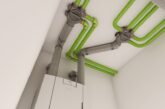
A self-build project in the stunning countryside of North East England has benefitted from Isover’s Metac, chosen for its excellent thermal and acoustic properties, as well as being the perfect fit for the architectural design of the property.
Patrick Ward, director of a building company covering everything from general maintenance to new-build projects, began the special journey of building a home for his family in June 2018. Located in the heart of the Northumberland countryside, the stone-built property features extensive glazing, skylights and bi-folding doors, all of which provide views out onto the surrounding fields and rolling hills.
Patrick said: “As a builder, it had long been a dream of mine to build a house for me and my family and I was finally granted the opportunity to do so when this piece of land came up for sale. I had already decided that I wanted to manage the project as a whole and have since been actively involved with the build at every stage of the process.
“When it came to specifying the insulation, I knew I wanted a product that could offer both superior thermal and acoustic performance, especially considering our rural and exposed location. I was already aware of Isover from my time spent in the construction industry and have previously used its products on many projects over the years, so I know they are high-quality.
“After discussing the various insulation possibilities with Dean Wilson, area sales manager for the North East and Cumbria at Isover, he recommended Metac 175mm thick glass mineral wool insulation, with an additional 50mm Metac between battens installed below the rafters. Due to the architectural design of the house featuring pitched and sloping roofs, it was deemed to be the best fit.”
Metac, a glass mineral wool ‘slab on a roll’ insulation, is specifically designed for use in pitched roof rafter applications, delivering a range of benefits to both the installer and homeowner. As well as excellent thermal performance, capable of achieving U-values that meet and exceed the minimum required by Approved Document L1A, Metac also has proven acoustic properties, helping to reduce external noise from extreme weather, aircraft and traffic. In fact, recent testing at the University of Salford has revealed that Metac can reduce externally-generated airborne sound by up to 49dB (Rw) within pitched roof rafter applications.
Patrick continued: “Isover assisted at every stage of the specification process. I provided Dean with a set of the working architectural drawings and he was then able to calculate exactly what products I needed in order to comply with the U-value requirements. This in turn helped with the SAP calculations. Considering the large number of windows, skylights and bi-folding doors, and our exposed location, all of which could negatively impact on the property’s overall energy efficiency, it was vital that we specified high-performing insulation with excellent thermal properties to achieve the necessary SAP rating. Thanks to Metac, we were able to achieve a pitched roof U-value of 0.14 W/m2K – an excellent result!”
What’s more, in addition to its thermal and acoustic performance, Metac is also renowned for its ease of installation, as Patrick commented: “The whole process was very quick and straightforward, with Metac being both easy to handle and install, saving valuable time on site. I was really pleased with it!”
Metac is both flexible and can be easily friction fitted between rafters, with any off cuts simply re-used within tighter rafter spaces, minimising air gaps and the amount of material waste generated. What’s more, manufactured from up to 80 per cent recycled glass it is also non-combustible, achieving a Euroclass A1 reaction to fire rating – the best attainable.
![]()







